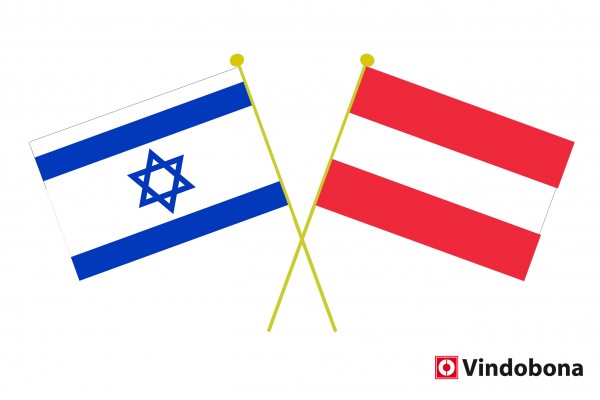Solidarity with Israel in the Austrian National Council
In a remarkable session of the Austrian National Council, strong solidarity with Israel and a clear condemnation of Hamas and its terrorist attacks were demonstrated. The unanimous decision of the MPs reflects Austria's stance on the Middle East conflict and the violence in the region.
 In the National Council meeting, the MPs unanimously voted to stand in solidarity with Israel and its people and to condemn Hamas and its terrorist attacks. / Picture: © Israeli and Austrian crossed flags by Vindobona
In the National Council meeting, the MPs unanimously voted to stand in solidarity with Israel and its people and to condemn Hamas and its terrorist attacks. / Picture: © Israeli and Austrian crossed flags by Vindobona
MEPs from the ÖVP, Greens, SPÖ, and NEOS parties voted together in favor of a resolution that not only expresses solidarity with Israel but also condemns the acts of violence committed by Hamas. This resolution, dated October 19, calls on the Austrian government to continue its intensive efforts to contain the conflict and to use all diplomatic means to support a peace process.
Humanitarian measures and peace efforts
The resolution also focuses on demands for compliance with international humanitarian law and access to humanitarian corridors. MPs emphasize the need for a lasting and sustainable peace solution in the Middle East, based on a two-state solution.
Another important aspect is the continuation of the fight against anti-Semitism, racism, extremism, hate speech, and hate propaganda both in Austria and in Europe. The MPs reaffirm that there must be no compromise with enemies of liberal democracy, such as the Hamas terrorists.
Cross-party perspectives
In the session of the Austrian National Council, Austria's political opinion became clear: support for Israel and condemnation of Hamas.
Reinhold Lopatka of the ÖVP emphasized the importance of the unanimous decision as a strong signal. This statement reflects the political power's understanding of unity and consensus in the international arena. Lopatka recognized that such united action by Austria's parliament not only sends a message to the international community but also underscores the country's seriousness and commitment to the Israeli-Palestinian conflict. His words reflect a deep understanding of the importance of symbolic gestures in diplomacy.
Christoph Matznetter of the SPÖ, on the other hand, emphasized the importance of creating prospects for the future. This statement shows a deep awareness of the need for long-term solutions and the importance of hope and development in a conflict that has been going on for decades. Matznetter's emphasis on prospects points to an approach that goes beyond immediate crisis intervention and focuses on the roots of the conflict and the needs of the affected populations.
Susanne Fürst of the FPÖ expressed her skepticism about the planned payments to Palestinians, but at the same time emphasized the importance of peace efforts. Her comments reflect the tensions that often arise in the debate about financial support in conflict regions. Fürst's concerns about the effective use of aid funds shed light on the need for transparency and accountability in international aid, while her support for peace initiatives reflects the general Austrian stance on promoting peace and stability in the region.
Ewa Ernst-Dziedzic from the Greens and Helmut Brandstätter from NEOS spoke about the complexity of the conflict and the need for a comprehensive peace solution. Their comments underline the complexity of the Israeli-Palestinian conflict and the challenges arising from its long history, deep-rooted political and religious tensions, and international dimensions. Their call for a comprehensive solution points to a holistic approach that takes into account all aspects of the conflict and addresses not only the symptoms but also the underlying causes.
From the symbolic power of political unity to the need for long-term perspectives and consideration of the complexity of the conflict, this debate offers valuable insight into the different ways in which Austria would like to contribute to the promotion of peace and stability in the Middle East.
Foreign Minister Alexander Schallenberg's perspective
Foreign Minister Schallenberg reaffirmed the importance of the unanimous decision and outlined the government's priorities: Avoidance of a major conflict, unconditional release of the hostages, and intensive humanitarian aid. He also emphasized that future development work must be carefully and deliberately designed.
This decision by the National Council represents an interesting moment in Austrian foreign policy and signals a strong and unified position towards the conflict in the Middle East, especially about Israel and Hamas.



